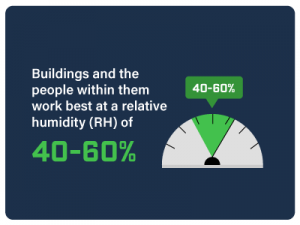How Does Humidity Affect Your Business?
Portland metro area business owners often struggle with humidity in commercial buildings. Pacific Northwest winter rains and summer humidity year after year can greatly impact your properties. Fortunately, there are steps you can take to mitigate humidity and ensure your buildings last for many decades, while also protecting the health of the people who use them.
 How is Humidity Bad for Commercial Buildings?
How is Humidity Bad for Commercial Buildings?
High humidity in commercial buildings can cause many troublesome issues, including:
Mold and Bacteria
Mold and bacteria growth are a perennial problem in places where there is excessive moisture. Often these replicate inside walls, air ducts, and other interstitial spaces that are hidden from plain sight. These pathogens commonly cause allergies and respiratory issues like asthma.
Our HVAC contractors can assess your building for mold and bacteria. We’ll optimize your AC and heating systems and perform duct cleaning to prevent future infestations.
Structural Damage
High humidity damages building materials. Wood swells and will rot if left damp for too long. Insulation, roofing, adhesives, fasteners, wires, paint, and other building components can also decay when subject to excessive moisture. This can lead to costly repairs and reduced energy efficiency.
Damage can occur in any season. Fluctuations between too wet in winter and too dry in summer will make building materials repeatedly warp, swell, and shrink. Hard surfaces like concrete and bricks crack under these conditions. Keeping your heating and AC systems working optimally all year can help avoid these problems.
Degraded Equipment
Damp air corrodes computers and machinery. Overly dry air creates static electricity, which affects expensive electronics. Keeping humidity at ideal levels will make your equipment work better and last longer.
Health Risks
High humidity environments make people feel uncomfortable. They can even become more susceptible to heat-related health problems. Managing indoor humidity helps keep your workers out of danger.
How to Keep Humidity at Safe Levels
Buildings and the people within them work best at a relative humidity (RH) of 40-60%. Our commercial HVAC experts can test humidity levels and recommend appropriate monitoring equipment so you can maintain this important setting in your workspace. Here are some solutions to common humidity problems found in the Portland area.
Minimize Moisture Sources
Maintain your commercial building to prevent moisture from entering through roofs, walls, windows, ventilation systems, exterior paint, and damp inventory.
Also, beware of cold bridges. These areas, usually caused by equipment or construction material, create thermal conduction. Outdoor air gets pulled inside the building at a different temperature from the indoor air, which creates condensation.
Boost Temperature
One of the simplest ways to reduce humidity during wet winters is to increase the indoor temperature. For best energy efficiency, make sure your HVAC system is appropriate for your space and running at optimal settings.
Regulate Humidity
In overly humid buildings, installing commercial dehumidifiers will reset the RH to levels that protect both your building’s structure and the people inside it.
You can also lower humidity when our HVAC installers design an air handler unit for your building. These regulate and circulate air and improve indoor air quality.
Portland HVAC Contractors Who Understand Our Climate
Understanding the climate challenges of your local area is key to optimally maintaining your commercial building. For over 50 years, AAA Heating and Cooling has been solving humidity problems for Pacific Northwest business owners. We can do the same for you! Contact us today to learn more about HVAC solutions for your Portland-area property.